Diplomatic Bluebook 2018
Chapter 2
Japan's Foreign Policy that Takes a Panoramic Perspective of the World Map
2 Canada
(1)Situations of Canada
The Trudeau administration, inaugurated in November 2015, is running the Government steadily backed by a stable approval rating.
On the diplomacy front, Canada has traditionally engaged in diplomacy in multinational venues such as the UN, the North Atlantic Treaty Organization (NATO), the G7, the G20, and the Organization of American States (OAS), based on close U.S.-Canada relations. The Trudeau administration, in particular, has based its diplomatic policies on multilateralism, and is returning to multinational diplomacy through active engagements in humanitarian and international cooperation efforts, such as accepting Syrian refugees and the ratification of the Paris Agreement on climate change. At the same time, the administration is showing a proactive stance towards bilateral diplomacy through high-level foreign visits and dialogues with foreign leaders.
On the economic front, against the backdrop of favorable economic conditions, the Trudeau Government is moving ahead with proactive policies in principle aimed at the creation of employment and wealth for the middle class, as well as enhancement of investment in domestic infrastructures, including through the establishment of the Canada Infrastructure Bank. With regard to international economic matters, Canada is advancing its basic policy of progressive trade aimed at the creation of employment for the middle class, under which it has worked to promote the Comprehensive Economic and Trade Agreement (CETA), to strengthen North American economic relations and economic relations with emerging markets such as China and India.
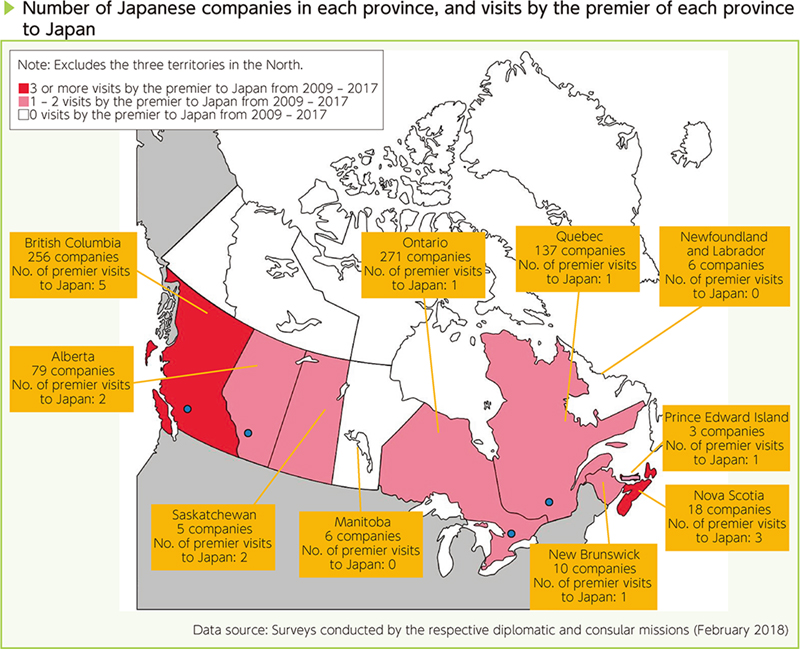
(2) Japan-Canada Relations
Japan and Canada are important partners for each other in the Asia-Pacific region. As G7 members, the two countries also cooperate closely in a wide range of fields including politics, economics, security, and people-to-people exchanges.
In May, Prime Ministers Abe and Trudeau spoke briefly at the G7 Summit held in Taormina, Italy, and welcomed the agreement in principle on the Japan-Canada Acquisition and Cross-Servicing Agreement (ACSA) and agreed to continue working towards signing the agreement as soon as possible. The two leaders also held three telephone conferences in February, June, and October, during which they engaged in intensive discussion centering on the regional situation, including the North Korea issue, and trade-related issues such as the TPP agreement.
In September, Foreign Minister Kono held talks with Foreign Minister Freeland in New York on the occasion of the UN General Assembly. The two ministers agreed to engage in bilateral coordination on maximizing pressure on North Korea and cooperation aimed at resolving the abductions issue. The ministers also exchanged their views on the North American Free Trade Agreement (NAFTA) and reform of the UN Security Council, and affirmed that Japan and Canada would promote bilateral and international cooperation under the “A New Era for Cooperation between Japan and Canada” framework. The ministers also held talks on November 8 during the APEC ministerial meetings in Danang, Vietnam, and reaffirmed the need to maximize pressure on North Korea. They also discussed the strengthening of bilateral relations and issues in the international arena such as the promotion of free trade, nuclear disarmament, and reform of the UN Security Council.
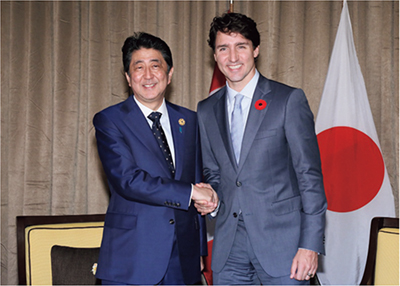 Prime Minister Abe shaking hands with Prime Minister Trudeau (November 10, Danang, Vietnam; Photo: Cabinet Public Relations Office)
Prime Minister Abe shaking hands with Prime Minister Trudeau (November 10, Danang, Vietnam; Photo: Cabinet Public Relations Office)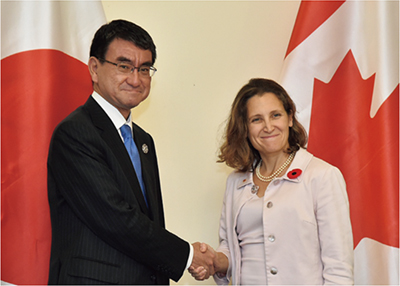 Japan-Canada Foreign Ministerial talks (November 8, Danang, Vietnam)
Japan-Canada Foreign Ministerial talks (November 8, Danang, Vietnam)In March 2018, Canada, together with ten other countries, signed the Comprehensive and Progressive Agreement for the Trans-Pacific Partnership (The TPP 11), in Chile, where Canada announced that it will move ahead with necessary domestic processes for an early ratification. This means the establishment of an economic partnership agreement between Japan and Canada is expected, and that economic relations between the two countries will be further strengthened.
The 10th Japan-Canada Political-Military and Military-Military (PM/MM) talks were held in Ottawa in December, and the two countries affirmed the continuation of bilateral coordination on security. The 15th Japan-Canada Symposium on Peace and Security Cooperation, also held in Ottawa, was attended by government officials from both countries and saw a vigorous exchange of opinions.
There have also been frequent high-level Japan-Canada visits, with visits to Japan from members of the federal Government of Canada, such as Minister of International Trade Champagne, Minister of Sport and Persons with Disabilities Qualtrough, and the premiers of Alberta, British Columbia, and Nova Scotia.
A large number of Nikkei people were forcibly relocated from British Columbia to Lethbridge, Alberta during World War II. As a result, there remains a large Nikkei population living in Lethbridge today. The city is also home to The Nikkei Cultural Society of Lethbridge and Area.
The Nikka Yuko Japanese Garden first opened in 1967, marking the 100th anniversary of the confederation of Canada, to commemorate the contribution of Nikkei people to the multicultural society of Lethbridge. Since then, as a symbol of the friendship between Japan and Canada, the garden has become an important tourist resource for the city of Lethbridge as well as a place of recreation for local people.
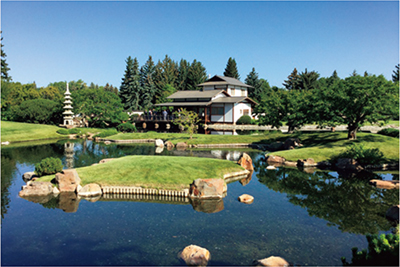 Nikka Yuko Japanese Garden
Nikka Yuko Japanese GardenDuring the construction of this garden, utmost care was taken to incorporate a traditional Japanese aesthetic philosophy as well as the local vegetation, topography and culture of Alberta. Today, the garden represents an amalgamation of Japanese culture and the natural beauty of Alberta. The garden is used to host a variety of Japanese cultural events, including tea ceremony demonstrations and Bonsai exhibitions.
The Nikka Yuko Japanese Garden has close ties with Japan's Imperial Family. The garden's opening ceremony in 1967 was graced by Their Imperial Highnesses Prince and Princess Takamatsu, and the 25th anniversary celebration held in 1992 was graced by Their Imperial Highnesses Prince and Princess Takamado. In 2017, a large celebration was held for two days on July 14 and 15 to commemorate the garden's 50th anniversary, which was graced by Her Imperial Highness Princess Ayako of Takamado. In remarks at the festivities, Her Imperial Highness extolled the achievements of Japanese-Canadians who have overcome a great deal to establish their current position in society, and indicated that the Nikka Yuko Japanese Garden─long maintained and cared for by the people of Lethbridge─stands as a symbol of the friendship of not only Japan and Canada but also Japanese-Canadians and both countries, sharing her hope that this relationship will continue forever.
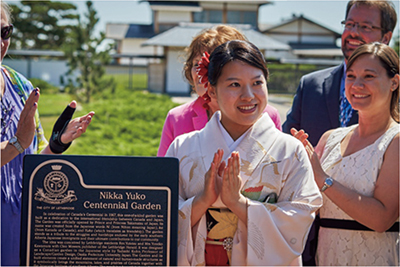 Unveiling ceremony for the 50th anniversary commemorative monument at Nikka Yuko Japanese Garden graced by Her Imperial Highness Princess Ayako of Takamado
Unveiling ceremony for the 50th anniversary commemorative monument at Nikka Yuko Japanese Garden graced by Her Imperial Highness Princess Ayako of Takamado(July 14, Lethbridge, Canada, Photo: Nikka Yuko Japanese Garden)
In addition, Consul General Kunihiko Tanabe of the Consultate-General of Japan in Calgary awarded the 2017 Foreign Minister Commendation to the Nikka Yuko Japanese Garden, lauding the garden's role in promoting friendly relations between Japan and Canada as well as promoting understanding of Japan.

